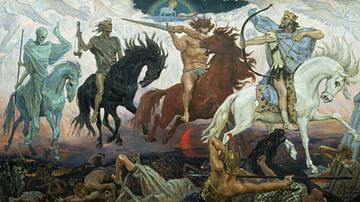Search
Search Results

Video
How We Conquered the Deadly Smallpox Virus - Simona Zompi
View full lesson: http://ed.ted.com/lessons/how-we-conquered-the-deadly-smallpox-virus-simona-zompi For 10,000 years, humanity suffered from the scourge of smallpox. The virus killed almost a third of its victims within two weeks and left...

Definition
Johann Eck
Johann Eck (l. 1486-1543) was a Catholic theologian and writer best known for his disputations with Martin Luther (l. 1483-1546) beginning in 1517 and continuing until his death in 1543. Eck maintained the position that, if anyone could determine...

Definition
Poverty Point
Poverty Point is an archaeological and historic site in Louisiana, USA, dated to c. 1700-1100 BCE, enclosing one of the most significant Native American mound sites from Pre-Colonial America. It was once the location of a grand complex of...

Definition
Germ Theory
The germ theory, which emerged in the late 19th century, demonstrated that microscopic germs caused most human infectious diseases. The germs involved included bacteria, viruses, fungi, protozoa, and prions. Louis Pasteur (1822-1895), a French...

Definition
Walpurgis Night
Walpurgis Night (30 April, annually) is a modern-day European and Scandinavian festival derived from the merging of the ancient pagan celebration of Beltane with the commemoration of the canonization of the Christian Saint Walpurga (l. c...

Definition
Moundville
Moundville is an archaeological site and park in Hale County, Alabama, USA on the Black Warrior River enclosing a Native American site dated to c. 1100 - c. 1450 CE. The earthen mounds which give the site its modern name were built by an...

Article
Biblical Apocalypse
Apocalypse (Greek: apokalypsis, an "unveiling of secrets") is not an event, but a text that contains prophesies concerning God’s future intervention, and apocalypticism is a reference for attitudes and worldviews in biblical and non-canonical...

Article
The Plague at Athens, 430-427 BCE
In the second year of the Peloponnesian War, 430 BCE, an outbreak of plague erupted in Athens. The illness would persist throughout scattered parts of Greece and the eastern Mediterranean until finally dying out in 426 BCE. The origin of...

Article
Marcus Aurelius: Philosopher Emperor or Philosopher-King?
Co-authored by Steven Umbrello and Tina Forsee It is very common to hear in both academic circles, as well as more close-knit Stoic circles, Marcus Aurelius (121 – 180 CE) being referred to as the philosopher king. This is not an idea...

Interview
Interview: Rome Strategy of Empire by James Lacey
In this interview, World History Encyclopedia sits down with author James Lacey to chat about his new book Rome: Strategy of Empire published by Oxford University Press. Kelly: Can you tell us a little bit about your background? James...